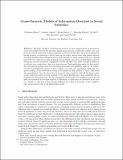Game-Theoretic Models of Information Overload in Social Networks
Author(s)
Borgs, Christian; Chayes, Jennifer; Karrer, Brian; Meeder, Brendan; Ravi, R.; Reagans, Ray Eugene; Sayedi, Amin; ... Show more Show less
DownloadBorgsetal.pdf (234.7Kb)
OPEN_ACCESS_POLICY
Open Access Policy
Creative Commons Attribution-Noncommercial-Share Alike
Terms of use
Metadata
Show full item recordAbstract
We study the effect of information overload on user engagement in an asymmetric social network like Twitter. We introduce simple game-theoretic models that capture rate competition between celebrities producing updates in such networks where users non-strategically choose a subset of celebrities to follow based on the utility derived from high quality updates as well as disutility derived from having to wade through too many updates. Our two variants model the two behaviors of users dropping some potential connections (followership model) or leaving the network altogether (engagement model). We show that under a simple formulation of celebrity rate competition, there is no pure strategy Nash equilibrium under the first model. We then identify special cases in both models when pure rate equilibria exist for the celebrities: For the followership model, we show existence of a pure rate equilibrium when there is a global ranking of the celebrities in terms of the quality of their updates to users. This result also generalizes to the case when there is a partial order consistent with all the linear orders of the celebrities based on their qualities to the users. Furthermore, these equilibria can be computed in polynomial time. For the engagement model, pure rate equilibria exist when all users are interested in the same number of celebrities, or when they are interested in at most two. Finally, we also give a finite though inefficient procedure to determine if pure equilibria exist in the general case of the followership model.
Date issued
2010-12Department
Sloan School of ManagementJournal
7th International Workshop on Algorithms and Models for the Web Graph, WAW 2010, December 13, 2010 - December 14, 2010.
Publisher
Springer-Verlag
Citation
Borgs, Christian et al. "Game-Theoretic Models of Information Overload in Social Networks." in Algorithms and Models for the Web-Graph (Lecture Notes in Computer Science), 2010, Volume 6516/2010, 146-161.
Version: Author's final manuscript
ISBN
9783642180095
3642180094